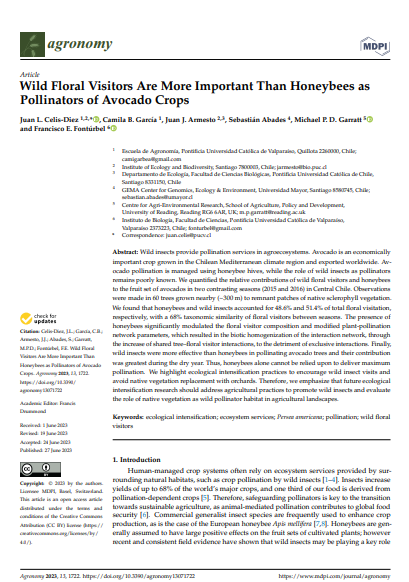Wild Floral Visitors Are More Important Than Honeybees as Pollinators of Avocado Crops

Fecha
2023-08-12Autor
Celis-Diez, Juan L. L.
García, Camila B. B.
Armesto, Juan J. J.
Abades, Sebastian [Univ Mayor, GEMA Ctr Genom Ecol & Environm, Chile]
Garratt, Michael P. D.
Fontúrbel, Francisco E. E.
Ubicación geográfica
Notas
HERRAMIENTAS
Acceda a títulos restringidos
¿Cómo descargar?Resumen
Wild insects provide pollination services in agroecosystems. Avocado is an economically important crop grown in the Chilean Mediterranean climate region and exported worldwide. Avocado pollination is managed using honeybee hives, while the role of wild insects as pollinators remains poorly known. We quantified the relative contributions of wild floral visitors and honeybees to the fruit set of avocados in two contrasting seasons (2015 and 2016) in Central Chile. Observations were made in 60 trees grown nearby (similar to 300 m) to remnant patches of native sclerophyll vegetation. We found that honeybees and wild insects accounted for 48.6% and 51.4% of total floral visitation, respectively, with a 68% taxonomic similarity of floral visitors between seasons. The presence of honeybees significantly modulated the floral visitor composition and modified plant-pollination network parameters, which resulted in the biotic homogenization of the interaction network, through the increase of shared tree-floral visitor interactions, to the detriment of exclusive interactions. Finally, wild insects were more effective than honeybees in pollinating avocado trees and their contribution was greatest during the dry year. Thus, honeybees alone cannot be relied upon to deliver maximum pollination. We highlight ecological intensification practices to encourage wild insect visits and avoid native vegetation replacement with orchards. Therefore, we emphasize that future ecological intensification research should address agricultural practices to promote wild insects and evaluate the role of native vegetation as wild pollinator habitat in agricultural landscapes.
URI
https://repositorio.umayor.cl/xmlui/handle/sibum/9517https://www.mdpi.com/2073-4395/13/7/1722/pdf?version=1687854381
https://doi.org/10.3390/agronomy13071722
https://centaur.reading.ac.uk/112407/1/Celis-Diez%20et%20al.%202023.pdf
Coleccion/es a la/s que pertenece:
Si usted es autor(a) de este documento y NO desea que su publicación tenga acceso público en este repositorio, por favor complete el formulario aquí.